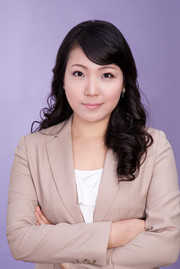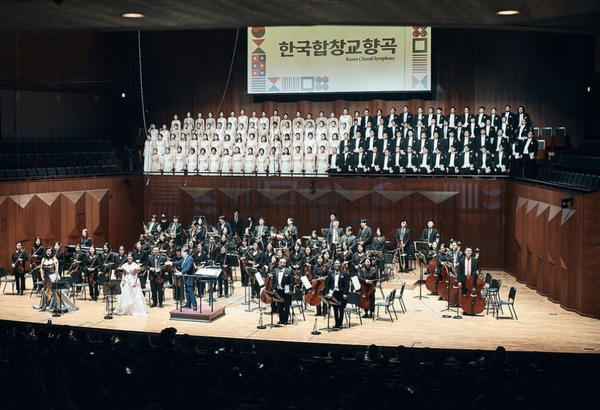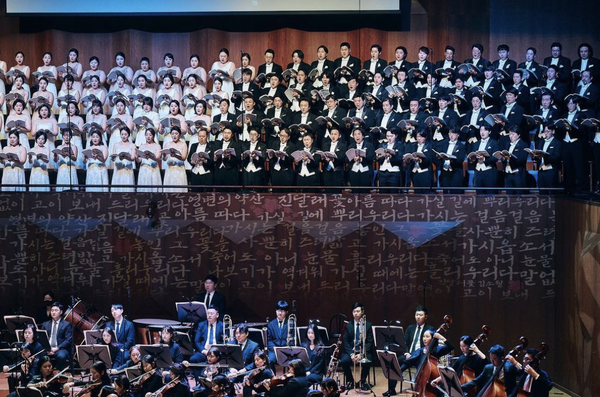Composed "Korean Choral Symphony" to commemorate the 50th anniversary of the National Chorus of Korea
"Arirang" was expressed in various forms throughout the four movements
"I want to let the world know the beauty of Korea through music"
Han Ah-reum (Department of Composition, class of ‘96) alumna premiered "Korean Choral Symphony" with the National Chorus of Korea at the Seoul Arts Center on the 21st of last month. Han, a full-time composer of the National Chorus of Korea, composed the song to commemorate the 50th anniversary of the National Chorus of Korea and successfully completed its premiere. We interviewed her, who composed a great song that compiled Korean poetry, folk songs, and history, regarding the "Korean Choral Symphony" and her musical world.

Han graduated from Hanyang University's Department of Composition and the Graduate School of Composition and Ph.D. at West Virginia University in the U.S. Since then, Han has worked as a full-time composer at the National Chorus of Korea and planned to compose a song to celebrate its 50th anniversary. As it is a very meaningful work, she wanted to make a different genre of music, not a cantata (a large-scale vocal song that includes solo, duet, and chorus with orchestra accompaniment) that she had mainly played. As a result, the "Korean Choral Symphony," which combines symphonies and chorus, was born.
The "Korean Choral Symphony" consists of four movements according to the general symphony format. The first movement of the "Korean Choral Symphony" has the subtitle "Korean History," the second movement "Korean Poetry," the third movement "Arirang Collection," and the fourth movement "Korean Dream."
Regarding the first movement that sang "Korean History," Han expressed her intention in composing the song, saying, "It poetically expressed the history of our country. The second movement, subtitled "Korean Poetry," consists of Korean-loved poems "Azalea Flower" and "Foreword." The theme of the third movement is "Arirang," Korea's representative folk song. Han composed the third movement by arranging three Arirangs: Jindo Arirang, Miryang Arirang, and Bonjo Arirang (former Arirang) or composing new melodies.
The fourth movement was made under the theme of the “Korean Dream.” Han explained, "I included my love for the country and my desire for its harmony in the fourth movement." In order to effectively convey this message of harmony and hope, the phrase of "The Country I Want" in Dosan Ahn Chang-ho's speech and Baekbeom Kim Gu's autobiography "My Wish" was melted into the Arirang melody.
Regarding her intention in composing the song, Han said, "I wanted to let the world know about the unique cultures of Korea such as beautiful folk songs and poems." She added, "Now our country is divided into two sides in many ways," adding, "This song reflects the patriotism of our ancestors and expresses the desire to move forward as one."
The most important thing in making the "Korean Choral Symphony" was the balance between the chorus and musical instruments. It's because it is not a symphony if there are too many choirs, while it is not a choir symphony if there are too many instruments.

Another factor that Han focused on was "popularity." "The symphony is not an easy genre for the public because you have to sit and listen to it for a long time from the first to the fourth movement," she explained. Han chose "Arirang" to solve these shortcomings. "The Korean Choral Symphony is a masterpiece that lasts more than an hour," Han said. "In order to make this masterpiece not boring, we transformed Arirang, which is familiar to us, into various forms."
In the first movement, the front part of the Arirang is modified, and in the second movement, Arirang is sung as a choir a cappella. In the third movement, a waltz-style Arirang appears, and in the fourth movement, the a-cappella in the second movement is played as a string instrument. Han said, "I expressed Arirang differently for each movement, and I was proud because the response from the audience was very good."
Regarding another reason for choosing "Arirang," Han said, "I wanted to let the world know that Arirang is a more colorful and beautiful song." With this intention, she presented various beautiful Arirang, including Arirang Waltz, Arirang Fuga (a musical form in which one voice plays one melody, then another voice copy it, and continues in counterpoint), and Arirang a cappella.

Han chose choir composition among various genres because of the "charm of choir composition that varies depending on the expression of lyrics." “The chorus seems to be an easy genre, but it is a very difficult genre,” she said. "Depending on the way the lyrics are expressed, music comes out completely differently." As a representative example, she cited poet Kim So-wol's poem "The Azalea Flower." Many composers have written songs with this poem, but the songs made are all different. Han also added, "The charm of the chorus is that it is more appealing than instrumental music since it delivers lyrics directly." She plans to continue to compose many songs by combining chorus and instrumental music.
Regarding her future plans, Han said, "I will continue to work with the National Chorus of Korea on many projects, including concerts and events." In addition to the chorus, Han plans to work in various fields such as orchestras. She expressed her ambition, saying, "I want to let the world know about Korea's beautiful culture and spirit through various music that contains Korea."
Her time as a student at Hanyang University was the nourishment that created the current Han who is now. "What I learned and practiced in the undergraduate and graduate schools helped me a lot not only in studying abroad but also in becoming a composer," she stressed. She advised her juniors, "Even if you are motivated to do well you will be restricted in your activities when you lack the basics," adding, "The most important thing is to work hard in school and strengthen your basics."

